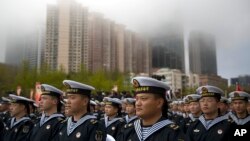The U.S. embassy on Tuesday urged the Cambodian government to defend its “neutrality policy” as it expressed concerns about a possible Chinese military presence on Cambodia’s coast.
The appeal came after Joseph H. Felter, Deputy Assistant Secretary of Defense for South and Southeast Asia, sent a letter to Cambodia’s Defense Minister Tea Banh, questioning the possibility of Chinese military presence at Cambodia’s Ream Naval Base in Preah Sihanouk province. The inquiry followed the Cambodian government’s unexpected rejection of U.S. assistance to repair facilities at the naval base.
Emily Zeeberg, a spokeswoman for the U.S. embassy in Phnom Penh, said the possibility of hosting a Chinese military base in Cambodia was “a real concern.”
“Given the high level of Chinese economic and political influence in Cambodia, this is a real concern,” she wrote in an email.
“Any steps that weaken Cambodia’s independence or open the door to a foreign military presence in Cambodia would be of serious concern to the United States and could threaten the credibility and centrality of ASEAN,” she said.
“We urge Cambodian leadership to maintain its constitutional commitment to an independent foreign policy and actively protect Cambodia’s independence for future generations,” she added.
On June 24, 2019, Felter wrote a letter to Tea Banh expressing concerns that the country’s rejection of U.S. assistance for repairing training facility and boat maintenance depot at Ream Naval Base is possibly Chinese-linked.
Felter recounted his visit in January to Ream Naval Base, where he received a request from a deputy commander who asked for assistance to repair the aforementioned facility.
After the rejection, Felter requested his Cambodian counterpart to provide a more detailed explanation for why these repairs—which the Cambodian navy requested—were no longer necessary.
Tea Banh told VOA Khmer that “the current naval base no longer exists and it does not need to be repaired.”
“For this matter, we haven’t done like what he said, the so call, rejection,” he added.
“For the front headquarters of maritime security, we have the intention to move to another place which is better and we want it to be modernized …so once it's done, we will remove this place. That's why we said it's not necessary to repair it.”
Chheang Vannarith, a regional analyst and director of the Asian Vision Institute, told VOA Khmer that Cambodia has no ambition to wage war against any country, so there is no reason to prove that Cambodia does need the presence of Chinese military on its soil.
Concerns of the possible presence of Chinese military in Cambodia was first raised in April 2018 by the U.S.-based Center for Advanced Defense Studies (C4ADS). C4ADS linked Chinese-owned Union Development Group, which has built large-scale infrastructures in Cambodia coastal Koh Kong province, to the People’s Liberation Army (PLA.)
Prime Minister Hun Sen strongly denied any reports that a Chinese-built port in Koh Kong province could be used to dock Chinese naval vessels, referencing to Cambodia’s constitution.




